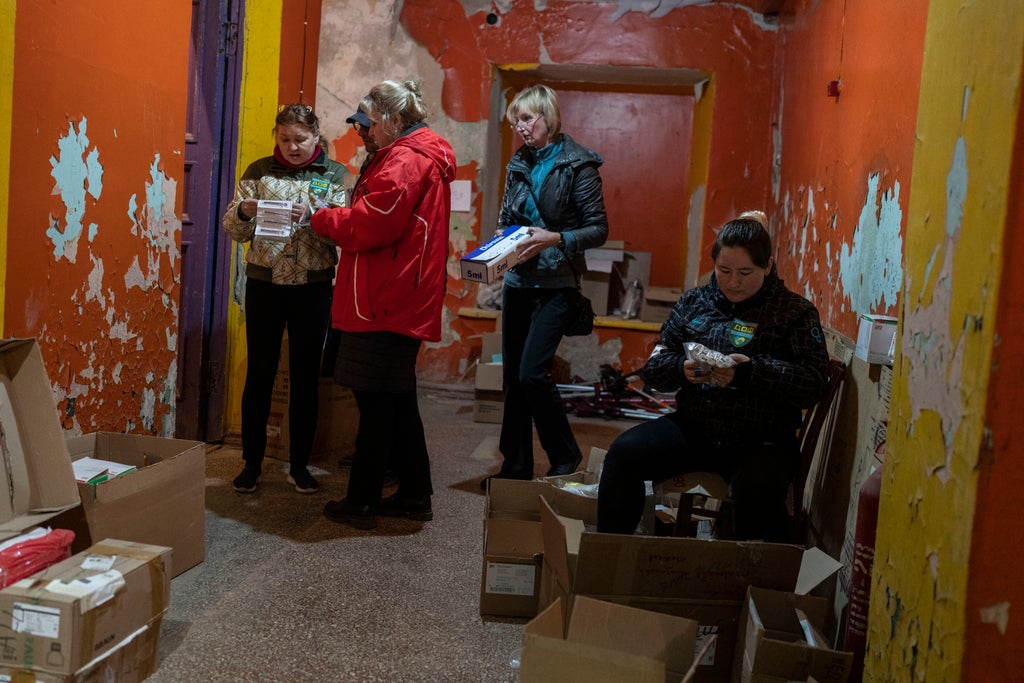
The United Nations chief launched an initiative Monday to immediately explore possible arrangements for “a humanitarian cease-fire in Ukraine” in order to allow the delivery of desperately needed aid and pave the way for serious political negotiations to end the month-long war.
Secretary-General Antonio Guterres said he used his “good offices” and asked Undersecretary-General Martin Griffiths, the head of the U.N.’s worldwide humanitarian operations, to explore the possibility of a cease-fire with Russia and Ukraine. He said Griffiths has already made some contacts.
“I hope that he will be able to go to both Moscow and Kyiv as soon as that becomes possible,” Guterres said. “It’s very important to establish a serious dialogue with both parties in relation to the possibility of this humanitarian cease-fire.”
The 193-member U.N. General Assembly, by an overwhelming majority of about 140 nations, has called for an immediate cessation of hostilities in Ukraine twice -- on March 2 and on March 24 -- and Guterres told reporters he thinks “this is the moment” for the United Nations “to assume the initiative.”
Since Russia’s invasion of Ukraine on Feb. 24, the secretary-general said, there has been a “senseless loss of thousands of lives,” displacement of 10 million people, systematic destruction of homes, schools, hospitals and other essential infrastructure, “and skyrocketing food and energy prices worldwide.”
Over the past month, U.N. humanitarian agencies and their partners have provided nearly 900,000 people, mainly in eastern Ukraine, with food, shelter, water and hygiene supplies, and the U.N. World Food Program is scaling up to reach 1.2 million people by mid-April, he said.
Osnat Lubrani, the U.N. humanitarian coordinator in Ukraine, said that on Monday U.N. agencies were able to bring food, medical supplies and household items to the besieged northeastern city of Kharkiv. The Ukrainian Red Cross will deliver them to the most vulnerable communities there as well as other hard-to-reach areas, she said.
But Guterres stressed that “the solution to the humanitarian tragedy is not humanitarian -- it is political.”
“I am therefore appealing for an immediate humanitarian cease-fire to allow for progress in serious political negotiations, aimed at reaching a peace agreement,” he said.
A cessation of hostilities will allow humanitarian aid to be delivered and people to move safely, the secretary-general said, and “it will save lives, prevent suffering, and protect civilians.” He expressed hope that it would also help address the global consequences of the war, including the existing “deep hunger crisis" in many developing countries from the COVID-19 pandemic, which is now compounded by soaring food and energy costs.
Guterres said he has been in close contact with Turkey, Qatar, Israel, India, China, France and Germany, “that have been talking to the parties at the highest level in order to explore the different forms of mediation leading to a political solution.”
“And it is my belief that all these efforts are essential in order to create the conditions to allow for, finally, this war to come to an end,” he said.
“I strongly appeal to the parties to this conflict, and to the international community as a whole, to work with us for peace in solidarity with the people of Ukraine and across the world,” the U.N. chief said.
The General Assembly resolution adopted last Thursday that urged an immediate cessation of hostilities focused on the deteriorating humanitarian situation in Ukraine and called for protection for millions of civilians and the homes, schools and hospitals critical to their survival as well as access for humanitarian workers and adherence to international humanitarian law.
France and Mexico, who spearheaded the resolution, called for a meeting of the U.N. Security Council to get an update on the humanitarian situation. Diplomats said it will take place on Tuesday afternoon.





.jpg?w=600)

